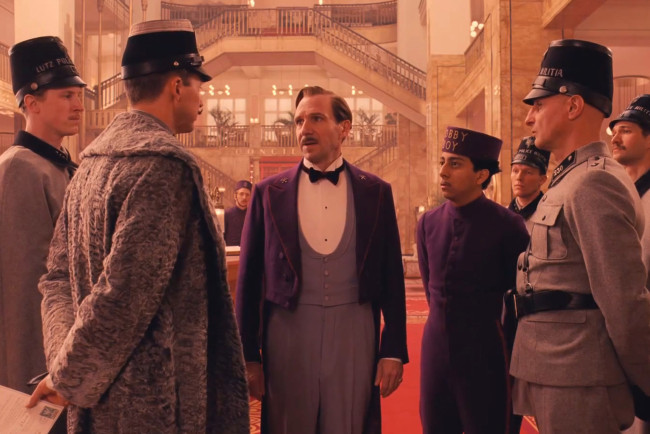The Grand Budapest Hotel
dir. by Wes Anderson
Wes Anderson’s last couple of efforts—Moonrise Kingdom and The Fantastic Mr. Fox—teetered dangerously on the brink of total exhaustion. On a first viewing the films played fine—smart, funny, colorful, full of whimsy—but on a second go-around, it took everything I could to plod through the sheer preciousness of it all. These films are Wes Anderson in his purest distilled form. Dancing foxes, military-minded boy scouts, prepubescent kids playing records on the beach while metaphorically confiscating each others virginity. Oh yeah, it’s all there. And not to mention the Frenchie frou-frou soundtracks. European as European gets. Wes has always loved cribbing from the late-great JD Salinger, but he’s at his best when he throws into the mix a little early-20th/late-19th-century British literature, as he did with The Royal Tenenbaums and the unjustly underrated The Darjeeling Limited. BothTenenbaums and Darjeeling had their fair share of mean-spirited sardonicism. Their character arcs were more pronounced; their chain of events more cruel, and—because of that cruelty—more human, more possessed of uncharacteristic fragility. Sure, sure, all of Anderson’s characters have experienced their moments of suffering, but usually as a result of rich-white-people ennui. Characters like Gwyneth Paltrow’s Margot Tenenbaum used to be the exception rather than the rule. Tenenbaums and Darjeeling were a lot funnier; and they were tempered down by something less fantastical and more believable.
Now, I know it’s unfair to compare a director to his earlier works, but when your aesthetic is as specific and inimitable as Anderson’s there’s scarcely anyone else left to compare him to. The man’s simply incomparable. He’s part of that rare group of living filmmakers who younger filmmakers try to ape on a regular basis. On the other side of that double-edged sword: it’s that specific aesthetic that makes his films so visually predictable. Because Anderson’s palette is so rigid in its formal presentation, the variation of stories he can tell, too, are limited.
That being said, The Grand Budapest Hotel is a sure-fire success.
As is typical of Wes Anderson tradition, The Grand Budapest Hotel inhabits a world far more anachronistic than ours. Anderson jumps back in time twice just to insulate our main tale—that of M. Gustave (Ralph Fiennes) and his Middle Eastern lobby boy Zero (Tony Revolori)—in a cozy cushion of melancholic nostalgia. Like sinking down into the bubbly depths of a warm bath, Anderson’s somewhat superfluously employed framing device soothes us into the picture’s comforts with slow, but melodious ease.
Set on the alpine peaks of the fictional nation of Zubrowka, the film follows the criminal misadventures of concierge supreme M. Gustave and his loyal partner-in-crime Zero as they abscond with a valuable family painting depicting a nubile young man and his green apple—Boy with Apple, as it’s succinctly titled. Along the way, the two players run over the toes of a dangerously wealthy Eastern European family led by the newly-minted patriarch Dmitri, a wonderfully villainous Adrien Brody, who claims that the painting is his and his sisters’ collective birthright. As we see early in the film, M. Gustave—a man who prides himself on wearing the pungent scent of a man whose presence lingers long past his exit—has a way with the ladies. Older ladies…much, much older. What makes M. Gustave such a capable concierge is his lascivious attendance to these old ladies. Charmed sufficiently by M. concierge’s sexy ways, Madame D. (Tilda Swinton, as unrecognizable as ever), right before her death, amends her will to grant M. Gustave sole proprietary rights of Boy with Apple. Needless to say this stirs the proverbial shit up for our heroic duo.
Ralph Fiennes hasn’t had this much fun since In Bruges. Everyone in the cast seems to be having a blast, but none more than Fiennes and his younger cohort Tony Revolori. Like Gene Hackman in The Royal Tenenbaums, Fiennes and Revolori don’t allow Anderson’s typical sterile handling of performances to bog their energy down. M. Gustave is full of vigor. Never far from his manners, his love for verse, his dainty vanity, M. Gustave sustains his resolve by remaining chipper and holding tight to his sometimes grand delusions. Most Anderson characters are touched with the marrow-deep fatigue of sorrowful defeat—all of which is self-inflicted. But nothing ever pins M. Gustave and Zero down, not anything internal at least. It isn’t till the two of them fall upon unspoken riches that the external—revolution and war—intervenes and pops their precious Anderson bubble of fantasy with the briefest, most cursory mentions of tragedy.
This film is far more violent and mad cap than I thought Anderson capable of. All through out the film, there’s a liberal deployment of unexpected gallows humor, bursts of jolly-ol’-gothic grimness, and this one bit with a cat and window that’ll shock you with laughter long after the joke and scene is over with. What’s most refreshing about the film’s sense of humor is its matter-of-factness. Anderson’s always had a proclivity for the understated, but here he turns it up a couple of decibels higher than usual by juxtaposing the outlandish with the static—as he does when M. Gustave finds out about his arrest for Madame D.’s murder: he sprints away from the picture plane and into the unremarkable background as the arresting officers stand around dumbstruck by the man’s misinformed display of bravado. The film is brutal, mean-spirited, and all the zanier for it.
In the ‘70s—and for some time after that—all the big American directors would momentarily indulge their id and make a “coke” movie, which meant numbing out all inhibitions with a rampant addiction to cocaine while shooting a movie with balls-to-the-wall abandon. Basically: “everything but the kitchen sink” filmmaking. These guys let it all hang out, every last drop. Scorsese had New York, New York, Coppola had Apocalypse Now, and De Palma had Scarface. This isn’t to say Anderson skipped off to the bathroom in between takes to resuscitate his keyed-up madness with a white-powdered toot, but still, The Grand Budapest Hotel crackles with that same soul-bearing, violently-repressed gusto—that irreverence, darkness, melancholy—that those other films had.
But: now that Anderson has indeed thrown everything in but the kitchen sink, I’m left to wonder: Where does he go from here? I can’t help but feel that anything more Wes Anderson-y than this and we’ll be dealing with self-parody. Thankfully, Anderson was able to spice The Grand Budapest Hotel up with enough new ingredients that we weren’t just retreading old, familiar flavors. There were enough new accents, new aromas, to keep us engaged. But still: how much more specific can Anderson get before our palates grow weary of his one-note insipidness?






